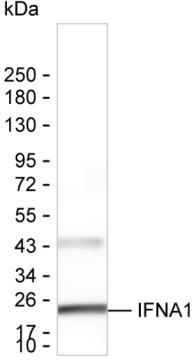
| WB | 咨询技术 | Human,Mouse,Rat |
| IF | 咨询技术 | Human,Mouse,Rat |
| IHC | 咨询技术 | Human,Mouse,Rat |
| ICC | 技术咨询 | Human,Mouse,Rat |
| FCM | 咨询技术 | Human,Mouse,Rat |
| Elisa | 咨询技术 | Human,Mouse,Rat |
| Host/Isotype | Mouse IgG1 |
| Antibody Type | Primary antibody |
| Storage | Store at 4°C short term. Aliquot and store at -20°C long term. Avoid freeze/thaw cycles. |
| Species Reactivity | Human |
| Immunogen | Purified recombinant fragment of human IFNA1 |
| Formulation | Purified antibody in PBS with 0.05% sodium azide |
+ +
以下是关于IFNA1抗体的3-4篇参考文献的简要总结:
1. **《A monoclonal antibody specific for human interferon-alpha 1》**
- 作者:Fujimori H, et al.
- 摘要:该研究开发了一种针对人IFNA1的单克隆抗体,验证了其特异性及在ELISA和免疫印迹中的应用,证实其不与其他干扰素亚型交叉反应。
2. **《Neutralizing antibodies against interferon-alpha subtypes in systemic lupus erythematosus》**
- 作者:Watanabe M, et al.
- 摘要:探讨系统性红斑狼疮(SLE)患者体内针对IFNA1等亚型的中和抗体水平,发现其与疾病活动度相关,提示抗体可能影响I型干扰素信号通路。
3. **《Structural basis of a specific anti-interferon-alpha antibody recognizing a conformational epitope》**
- 作者:Li Z, et al.
- 摘要:通过晶体学解析了抗IFNA1抗体与抗原的结合表位,揭示了其识别构象依赖性表位的机制,为治疗性抗体设计提供结构依据。
4. **《Autoantibodies to interferon-alpha in a patient with severe viral infection》**
- 作者:Pohl K, et al.
- 摘要:报告一例重症病毒感染患者体内存在高滴度抗IFNA1自身抗体,可能抑制IFNA1的抗病毒活性,提示此类抗体在免疫病理中的作用。
以上文献涵盖抗体开发、疾病关联及结构机制研究,均聚焦IFNA1抗体的特异性应用或病理意义。
Interferon alpha-1 (IFNA1) is a member of the type I interferon (IFN) family, a group of cytokines critical in innate immune responses against viral infections and immune regulation. IFNA1 binds to the IFN-α/β receptor (IFNAR), activating the JAK-STAT signaling pathway to induce expression of interferon-stimulated genes (ISGs) that mediate antiviral, antiproliferative, and immunomodulatory effects. Antibodies targeting IFNA1 are valuable tools for studying its biological functions, expression patterns, and therapeutic potential.
IFNA1 antibodies are commonly used in research applications such as ELISA, Western blot (WB), immunohistochemistry (IHC), and flow cytometry to detect endogenous IFNA1 protein levels in cell cultures, tissues, or biological fluids. They help elucidate IFNA1's role in diseases like autoimmune disorders (e.g., systemic lupus erythematosus), cancers, and viral infections (e.g., hepatitis, COVID-19). Some antibodies neutralize IFNA1 activity, enabling functional studies to dissect its contributions to pathological or protective immune responses.
Both monoclonal and polyclonal IFNA1 antibodies are available, with specificity validated through knockout controls or blocking assays. Researchers select antibodies based on host species, clonality, and application compatibility. Cross-reactivity with other IFN-α subtypes must be considered due to structural similarities. Commercial IFNA1 antibodies often include recombinant proteins for competitive validation. Beyond basic research, these reagents hold potential for diagnostic assays or therapeutic development, particularly in conditions where dysregulated IFN signaling drives disease progression.
×